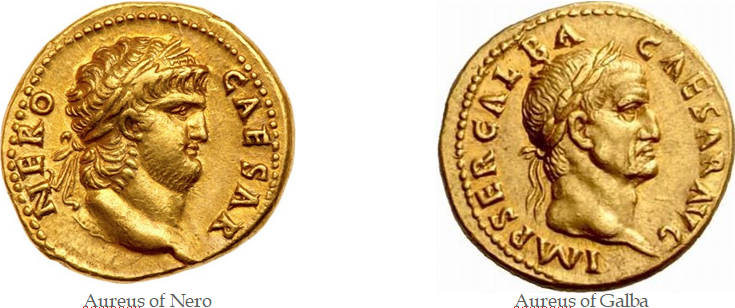THE STYLE OF LIFE AND MANNERS OF THE EMPERORS
The Epitome de Caesaribus Libellus de Vita et Moribus Imperatorum Breviatus was a brief account of the reigns of the Roman emperors from the accession to sole power of the first, Augustus, in 30 BC, to the death in AD 395 of Theodosius I, the last to rule over both east and west. It was written just after that, using lost sources, by an anonymous author, though once attributed to Sextus Aurelius Victor, who had written the Liber de Caesaribus a little earlier.
The translation from Latin is by Thomas M. Banchich in A Booklet about the Style of Life and the Manners of the Imperatores (Buffalo, New York, 2009).
After describing the great deeds of Augustus (ruled 30 BC – AD 14) and his good qualities, the author says “for all that, so great a man did not lack vices” …
| And though he was much at table or drink, to a certain degree, in fact, abstaining from sleep, he nevertheless used to gratify his lust to the extent of the dishonor of his public reputation. For he was accustomed to lie among twelve catamites[1] and an equal number of girls. | [xxii] Cumque esset cibi ac vini multum, aliquatenus vero somni abstinens, serviebat tamen libidini usque ad probrum vulgaria famae. Nam inter duodecim catamitos totidemque puellas accubare solitus erat. |

5. Domitius Nero
Describing the end of Nero in June AD 68, as the army of Galba approached to overthrow him:
| When Nero learned that Galba approached and that the senate had resolved that, according to ancestral custom, when his neck had been thrust into a yoke, he was to be beaten to death with rods, he, completely deserted, left the city in the middle of the night with Phaon, Epaphroditus and Neophytus, and the eunuch Sporus, whom once, after he had been castrated, he had tried to transform into a woman;[2] and he pierced himself with a blow of his sword, with the impure eunuch about whom we spoke aiding his trembling hand while, since no one had been found earlier by whom he might be struck, he soberly exclaimed: "So, do I have neither friend nor foe? I lived shamelessly, let me die shamefully." | [vii] Ubi adventare Nero Galbam didicit senatusque sententia constitutum, ut more maiorum collo in furcam coniecto virgis ad necem caederetur, desertus undique noctia medio egressus urbe sequentibus Phaone Epaphrodito Neophytoque et spadone Sporo, quem quondam exsectum formare in mulierem temptaverat, semet ictu gladii transegit adinvante trepidantem manum impuro, de quo diximus, eunucho, cum sane prius nullo reperto, a quo feriretur, exclamaret: "Itane nec amicum habeo nec inimicum? dedecorose vixi, turpius peream". |

6. Galba
On Galba, who reigned seven months AD 68-69:
| He was disreputable toward young men,[3] | [ii] Iste in adulescentes infamis |
23. Aurelius Antonius Varius, also called Heliogabalus
Describing the end in 222 of this adolescent of many names:
| He himself was killed in a military insurrection. His body was dragged through the streets of the city in the fashion of the corpse of a dog, to the accompanying soldierly jesting of people calling him a puppy-bitch of unrestrained and crazed lust.[4] | [v] Ipse tumultu militari interfectus est. [vi] Huius corpus per urbis vias more canini cadaveris a militibus tractum est militari cavillo appellantium indomitae rabidaeque libidinis catulam. |
[1] One of his catamites, Sarmentus, was mentioned incidentally in Plutarch’s Life of Antony 59 iv.
[2] Nero’s love affair with his freed slave-boy Sporus was described more fully by Suetonius, The Twelve Caesars 28 xix-xx, 46 ii, 48 I and 49 iii, all on this website.
[3] The Latin word is “adulescens”, but there is little point in quibbling about the best translation of that word since this is almost certainly sloppy reporting by the not-always-reliable author. The much earlier and better informed Suetonius, the tone of whose book suggests he shared the common assumption of the ancients that men were sexually interested in both women and boys, thought it worth remarking of Galba that he was “more inclined to desire for males, and not them unless they were hard and mature.” (The Twelve Caesars VII 22). His only lover mentioned, Icelus, was hoping to be made Prefect of the Praetorian Guard, so hardly sounds like an adolescent!
[4] “Heliogabalus” was aged about 14 to 18 as emperor, so a boy. To describe him as a puppy-bitch of crazed lust is therefore to imply great enthusiasm for the passive role in sex with men, as indeed was described at length in Cassius Dio’s Roman History LXXX and Aelius Lampridius’s biography (Augustan History XVII), the relevant passages of both of which are on this website.
Comments
If you would like to leave a comment on this webpage, please e-mail it to greek.love.tta@gmail.com, mentioning either the title or the url of the page so that the editor can add it.

Comments powered by CComment